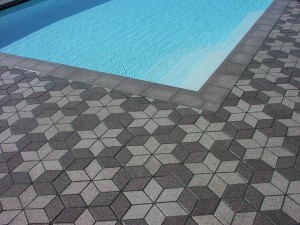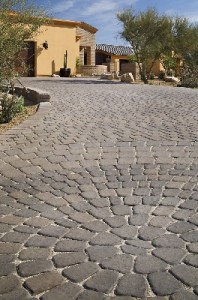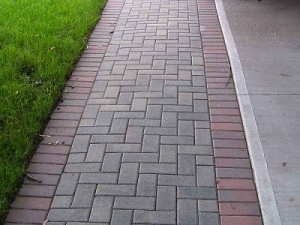
Landscaping with Concrete Pavers
 In recent blog posts I have written about gravel and permeable concrete as environmentally-friendly and attractive options for various hardscape uses in landscaping. Yet another option that is sustainable, versatile and attractive is concrete pavers. Pavers are pre-formed concrete” tiles” made to look like cobblestone, tile, brick, flagstone, slate, chiseled stone and other materials. Concrete pavers are evidently an increasingly popular choice for residential use as I have run across a plethora of information on the Internet touting their use in this way.
In recent blog posts I have written about gravel and permeable concrete as environmentally-friendly and attractive options for various hardscape uses in landscaping. Yet another option that is sustainable, versatile and attractive is concrete pavers. Pavers are pre-formed concrete” tiles” made to look like cobblestone, tile, brick, flagstone, slate, chiseled stone and other materials. Concrete pavers are evidently an increasingly popular choice for residential use as I have run across a plethora of information on the Internet touting their use in this way.
In the spirit of full disclosure, I will say up front that we do not recommend or use concrete pavers with our clients for two main reasons; 1) we don’t find the aesthetics to be quite “worthy” of the residential properties we have the privilege of working on and 2) we don’t necessarily agree 1000% with all the positive hype touting them over other concrete options. Don’t get me wrong, I think concrete pavers are often a good choice in commercial projects such as parks or schools, I just don’t feel they translate elegantly into home use. So to each their own. Aesthetics are subjective and personal and you can certainly make that decision for yourself.
With that, let’s talk about the positive aspects of concrete pavers. At first blush, interlocking pavers may seem like a more expensive option than some other choices, but they actually offer long-term cost-efficiency due to their durability. Because pavers are individual units, if one cracks at some point, it can be replaced. And the high number of joints in the surface facilitates drainage of water from rain, enhancing skid-resistance and decreasing nighttime glare.
Environmentally Friendly
Studies have revealed interlocking concrete pavements (ICPs) have an average life of at least 29 years. Concrete Pavers Earn LEED® Points and Permeable Interlocking Concrete Pavements (PICPs) are eligible for LEED® credits under the U.S. Green Building Councils (USGBC and CaGBC) guidelines.
Paver Driveways
Paver driveways are actually stronger than concrete, having two to three times the compressive strength and weight-bearing capacity of normal concrete. Installed properly, they are reportedly less prone to shifting, and should not settle or sag, even with heavy vehicle traffic or extreme weather changes.
 Paver Pathways and Walkways
Paver Pathways and Walkways
Professionally installed, pavers provide a durable, uniform surface. One of the biggest advantages of pavers is that in the event that something like a large tree root raises one or more of the pavers requiring repair, pavers are manufactured to be uniform so they can be replaced without leaving ugly patches or mismatched areas.
 Paver Patios and Courtyards
Paver Patios and Courtyards
Concrete pavers come in a wide variety of surface finishes, colors and shapes. Moreover, a skilled installer can create a variety of laying patterns, further expanding the customization possibilities.
“Concrete pavers” doesn’t have a very pretty ring to it, but taking into consideration all the benefits it offers as a hardscape choice it can be an attractive landscape materials option. To recap, concrete pavers:
- Come in a large range of colors and patterns
- Are strong (2-3X stronger than concrete)
- Have a long life expectancy (30+ years)
- Are low maintenance
- Are easily replaced if damaged
- Provide a non-slip surface